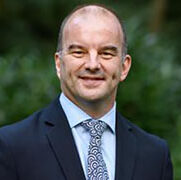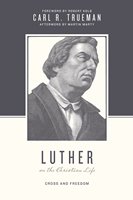From the start I thought Crossway’s Theologians on the Christian Life series was a great idea, and each new volume has confirmed it. Our good friend Carl Trueman (Professor of Church History at Westminster Theological Seminary, Pastor at Cornerstone Presbyterian Church in Ambler, PA, and member of our Board of Reference here at Books At a Glance) is always enjoyable to read, and his new Luther on the Christian Life makes a stellar contribution to this series. Carl has long been a student of Martin Luther, and we’re sure many will find his latest masterpiece both illuminating and uplifting. He clearly knows Luther well, and today he talks to us about his fascinating subject.
Books At a Glance (Fred Zaspel):
First, perhaps you could give us a sense of the influence and the historical and theological significance of Martin Luther. Of course you could write a large book on this, but can you capture it for us briefly?
Trueman:
Luther is the man who sets the terms of debate for later Protestantism. Whether we are talking salvation, sacraments, or authority, he is the person whose writings really lay out what is at stake in these issues, particularly in the disputes between Roman Catholicism and Protestantism, but also between the varieties of Protestantism as well
 Books At a Glance:
Books At a Glance:
Describe Luther the man for us. What was he like?
Trueman:
He was a very human figure, deeply flawed in many ways. Bull-headed, passionate, a man of emotional extremes, such that today we might perhaps diagnose him as something of a depressive. He was a faithful husband and loving father. A fine preacher. A courageous leader. A good churchman. A sinner saved by grace who knew that that was what he was.
Books At a Glance:
What were some of his leading areas of theological concern and emphasis?
Trueman:
I would say three areas are crucial matters of concern to him. First, authority: he argued for the clarity of scripture over against the notion that scripture was fundamentally obscure and therefore required the church as magisterium to interpret it. This is a more complicated issue than is often thought by Protestants but essentially Luther opened the Bible for the people.
Second, salvation. Luther set justification by grace through faith as mediated by hearing the Word of God over against the medieval notion of a sacramentally mediated salvation. That had immediate pastoral implications, as preaching supplanted the Mass as the center of worship.
Third, the sacraments. This is where many evangelicals (and I include myself to an extent) cannot follow Luther. His sacramental emphasis, though modified from that of the Middle Ages, was still much greater than the typical Protestant evangelicals today. He was, after all, the man who split Protestantism over the issue of the Lord’s Supper.
Books At a Glance:
Luther is often referred to as the theologian of justification because he emphasized so the nature of justification as a gift of divine righteousness in Christ received by grace through faith. What, for Luther, is the role of this understanding in the life of the Christian?
Trueman:
This provides the foundation both of the believer’s access to God (clothed in alien righteousness) and the foundation for practical ethics here on earth: we do good works for our neighbours out of gratitude for what God has first done for us in Christ.
Books At a Glance:
Explain for us what Luther meant by a theology (or theologian) of glory and a theology of the cross. What is the significance of this?
Trueman:
Put simply, a theologian of glory assumes that God is like himself. Thus, to understand God, one simply needs only to extrapolate from one’s own tastes and ideas and ascribe them to an infinite being. The theologian of the cross looks to where God has revealed himself in order to understand who God is towards us. One practical example would be good works: as human beings, we do good works to earn someone’s favour; Luther points out that the cross indicates that we do good works because God is already favourable towards us.
 Books At a Glance:
Books At a Glance:
You mention that Luther revolutionized thinking with regard to marriage and the family. How so? Can you sketch this out for us?
Trueman:
This is part of a much larger issue: what constitutes the sacred? In the Middle Ages, the sacred was constituted by particular holy callings, for example that of a monk or perhaps of a pilgrim. Luther saw that a calling is made holy not by its intrinsic quality but by whether it is pursued by faith and to the glory of God.
Now, the medieval church really privileged celibacy as a holy calling. What Luther’s theology does is make marriage into a holy calling when done in the Lord and to the glory of God.
Books At a Glance:
Can you characterize his own piety for us? What does Christian piety look like in Martin Luther?
Trueman:
His piety was very simple. He constantly told people they needed to have the mind of child when they came to the gospel. Practically, it was centred on church, the public reading and preaching of the Word, singing, prayer, the Lord’s Supper, and learning the catechism.
Books At a Glance:
Okay, let’s say a parishioner were to come up to him and ask, “Pastor Martin, how can I live a Christian life that is more to the glory of God?” How might he answer?
Trueman:
By faith. By having a childlike trust in the promises of God in Christ. What does this look like? Well, minimally it looks like joining with the saints to worship in church. Maximally, it looks like living one’s entire life as a constant turning from self in repentance and towards God in Christ in faith.
Books At a Glance:
What are some of Luther’s most important works? For those who would like to get a close, first-hand acquaintance with Luther – after reading your book, of course! – what should they read?
Trueman:
For fun, the Tabletalk. Though Luther himself declared that only The Bondage of the Will and his two Catechisms were worthy of preserving after his death. And who am I to try to improve on Luther’s own advice?

